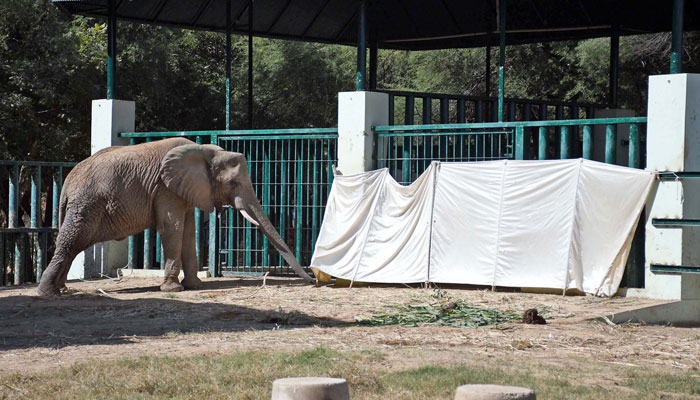Sonia’s story
Sonia’s death, like that of her sister has once again prompted promises of inquiries and investigations
The sudden and tragic death of Sonia, an African elephant housed at Karachi’s Safari Park, is an embarrassing and tragic reminder of Pakistan’s abject failure to ensure any kind of animal welfare. Sonia died after a life of captivity that animal rights activists say was much like other such zoo animals – marked by neglect and inadequate care. Her story, like those of many other animals in Pakistan’s zoos and parks, is one of mismanagement, poor facilities, and the lack of expertise necessary for the proper care of such magnificent creatures. Captured from the wild in Tanzania at a young age along with three other elephants, Sonia spent years in conditions far removed from the natural environment she was meant to thrive in. In her and the lives of others like her one can see the broader issues plaguing animal welfare in Pakistan, where the management of zoos and wildlife facilities often falls short of basic international standards. Injuries and health problems were a recurring theme for Sonia – reports earlier this year highlighting a foot injury and swelling that were said to have been exacerbated by unsuitable enclosures and poor veterinary care. Despite interventions from organisations like Four Paws International, meaningful improvements to her living conditions remained elusive.
Sonia’s death, like that of her sister Noor Jahan at Karachi Zoo last year, has once again prompted promises of inquiries and investigations. However, these responses have failed to address the deeper structural issues that perpetuate animal suffering in Pakistan. The government has yet to implement long-term reforms that could prevent such tragedies, instead relying on superficial measures that offer little more than temporary relief. The problems extend far beyond Karachi’s Safari Park. Across the country, animals in captivity suffer due to outdated infrastructure, insufficient funding, and untrained staff. Many zoos and parks are overcrowded, with enclosures that fail to provide even the bare minimum for the animals’ physical and psychological well-being. The legal framework governing animal welfare in Pakistan is equally deficient, leaving animals vulnerable to neglect and exploitation. Efforts by activists and animal welfare organisations to push for stronger protections have largely been met with bureaucratic inertia.
Will Sonia’s death change things? One hopes so but in all probability little will shift. The fact is that captive elephants require specialised care, large enclosures that replicate natural habitats, and consistent veterinary attention. These needs are not luxuries but necessities. Beyond this, there is an urgent need to modernise Pakistan’s animal welfare laws and enforce stricter regulations to protect both captive and wild animals. The role of zoos themselves must also be reconsidered. Around the world, there is growing recognition that traditional zoos, which prioritise display over conservation, are an outdated model. Pakistan should explore alternatives like wildlife sanctuaries that focus on the welfare and rehabilitation of animals rather than confining them for public amusement. The neglect and exploitation of animals, whether in captivity or the wild, reflect poorly on the values of any society. Animals are sentient beings with the right to live in dignity and safety, a right too often denied to them in Pakistan.
-
 18-month Old On Life-saving Medication Returned To ICE Detention
18-month Old On Life-saving Medication Returned To ICE Detention -
 Cardi B Says THIS About Bad Bunny's Grammy Statement
Cardi B Says THIS About Bad Bunny's Grammy Statement -
 Major Hollywood Stars Descend On 2026 Super Bowl's Exclusive Party
Major Hollywood Stars Descend On 2026 Super Bowl's Exclusive Party -
 Sarah Ferguson's Silence A 'weakness Or Strategy'
Sarah Ferguson's Silence A 'weakness Or Strategy' -
 Garrett Morris Raves About His '2 Broke Girls' Co-star Jennifer Coolidge
Garrett Morris Raves About His '2 Broke Girls' Co-star Jennifer Coolidge -
 Winter Olympics 2026: When & Where To Watch The Iconic Ice Dance ?
Winter Olympics 2026: When & Where To Watch The Iconic Ice Dance ? -
 Melissa Joan Hart Reflects On Social Challenges As A Child Actor
Melissa Joan Hart Reflects On Social Challenges As A Child Actor -
 'Gossip Girl' Star Reveals Why She'll Never Return To Acting
'Gossip Girl' Star Reveals Why She'll Never Return To Acting -
 Chicago Child, 8, Dead After 'months Of Abuse, Starvation', Two Arrested
Chicago Child, 8, Dead After 'months Of Abuse, Starvation', Two Arrested -
 Travis Kelce's True Feelings About Taylor Swift's Pal Ryan Reynolds Revealed
Travis Kelce's True Feelings About Taylor Swift's Pal Ryan Reynolds Revealed -
 Michael Keaton Recalls Working With Catherine O'Hara In 'Beetlejuice'
Michael Keaton Recalls Working With Catherine O'Hara In 'Beetlejuice' -
 King Charles, Princess Anne, Prince Edward Still Shield Andrew From Police
King Charles, Princess Anne, Prince Edward Still Shield Andrew From Police -
 Anthropic Targets OpenAI Ads With New Claude Homepage Messaging
Anthropic Targets OpenAI Ads With New Claude Homepage Messaging -
 US Set To Block Chinese Software From Smart And Connected Cars
US Set To Block Chinese Software From Smart And Connected Cars -
 Carmen Electra Says THIS Taught Her Romance
Carmen Electra Says THIS Taught Her Romance -
 Leonardo DiCaprio's Co-star Reflects On His Viral Moment At Golden Globes
Leonardo DiCaprio's Co-star Reflects On His Viral Moment At Golden Globes




